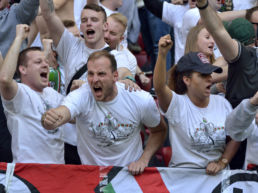As presented at the IF Forum, Lausanne, October 29, 2025
The sports industry is facing a crisis of relevance, not because of a lack of quality athletes or exciting events, but because of a flawed marketing strategy that is failing to build a memory for the future fan.
Globally, nearly 3 billion people engage with entertainment content via social media, of which 1.45 billion engage with sports content. These people spend over two hours twenty minutes daily on social media, yet only about 18 minutes of that time is allocated to sport, and there are more than 750,000 social media sports channels fighting for this attention. Sport’s battle for attention has never been tougher.
The world no longer waits for our marquee moments and the failure to acknowledge this reality creates two immense challenges.
The first is the Attention Shift – where once a few broadcasters owned the attention of many, hundreds of thousands of broadcasters, creators and channels now compete for the same attention. The impact is a polarised broadcast rights landscape where the big rights holders get win more and every other sport must find new value.
The second is the Sameness Problem.
In our industry bubble, we see every sport as fundamentally different. But from the perspective of a future fan, they all look remarkably similar: event calendars, results, underdog stories, passion, drama, and rivalry. It’s not wrong but it is repetitive and this repetition erodes distinctiveness. If fans struggle to remember your sport as it doesn’t stand out, they certainly won’t choose to engage, watch or participate in it.
The equation is simple: No Attention means No Growth, which means No Commercial Appeal.
The Formula for Sustainable Growth
To break this cycle, International Federations (IFs) must adopt a proven growth formula:
Growth = Distinctiveness + Reach
- Distinctiveness: Be remembered for something unique.
- Reach: Be seen often and everywhere. It’s how your sport shows up.
This formula is about turning potential future fans (those who aren’t following you yet) into current fans (those already engaged and following your sport). International Federations cannot just focus on engaging and selling tickets to people already in-market. Their job is to ensure their sport is remembered by future potential fans so that when they have a moment of choice, they choose your sport.
The Short-Term Trap: Starving the Emotional Engine
The biggest hurdle for IFs is a crippling focus on short-term activities. These are rational messages – fixtures, score updates, ticket sales, “100 days to go” announcements – aimed at existing fans to elicit an immediate response. All International Federations are delivering the same messages with the same tone of voice.
While this is not wrong, the problem is it does not highlight what makes the sport distinctive nor does it achieve the necessary reach to build memories among new potential audiences required to support long-term growth.
In sport, we see IFs allocating about 80-90% of their communications to these short-term efforts. Yet, marketing effectiveness research has shown that the broadly optimal balance for the best conversion is closer to 60% Long-Term (Brand-Building) versus 40% Short-Term (Sales).
The Solution: Distinctiveness and Cultural Relevance
To rectify this, IFs must refocus their resources on Brand-Building activities that highlights what makes their sport different and relevant to people in the context of their lives.
1. Define Your Meaningful Difference
The fundamental question for every federation is: What should your sport make people feel (beyond competition) and do you show that every day?
The brand of a sport or its essence, can be identified exploring three broad questions:
- Emotionally: How does it make people feel?
- Socially: How does it connect or create belonging?
- Functionally: What core benefit does it offer?
The best sports know the answer to all three and use all three in their communications, but the focus should always be on emotion – that’s what makes people care.
The combination of the answers to these questions creates a sport’s Meaningful Difference.
2. Amplify Reach through Culture
Once the meaningful difference is defined, representing the motivation behind why people engage with it as part of their lifestyle, it must be amplified by connecting the sport into broader culture where it will find a much larger audience that share the same passion points. i.e. to tap into future fans, you must connect your sport to a culture they already care about.
For example, Sport Climbing’s credibility starts with the sport itself, but its reach scales by connecting to shared passion points like Outdoor Lifestyle, Environmental Tourism, and Health & Wellbeing.
These are the spaces where new audiences discover what your sport stands for – even if they’ve never watched a competition.
3. Use Major Events to Create Memories
Major events like World Championships and the Olympic Games are the biggest stages a sport has. Their power lies not just in medals, but in the reach they deliver and the memories they create. When people feel something during those moments, it builds a cultural connection that lasts long after the event, fueling year-round relevance.
Learn about ‘A Bond Like No Other’, the Paris 2024 Olympic & Paralympic campaign Redtorch created and delivered for the FEI, leaning into what makes the sport meaningfully different to equestrian lovers and to achieve broad reach engaging people that love animals / pets.
Key Takeaways for Sustainable Relevance
To drive long-term growth and sustainable relevance, International Federations must commit to a strategic change:
- Stand Out: Make your sport more distinctive by investing in emotional storytelling that amplifies its difference.
- Mean Something: Build cultural relevance – stand for something people care about beyond competition.
- Reach More People: Connect into culture to show up year-round, removing a reliance on events and find new audiences with shared passions.
This is how you close the relevance gap and generate sustainable growth for your sport into the future.
The ROI? Sponsorship. Sponsors invest in sports that stand out, stand for something and connect meaningfully with audiences. Unless sports invest in growing their brand by highlighting their meaningful difference they will compete in the sponsorship market on reach alone, and that is a battle that can’t be won.
5 steps every International Federation should take:
- Audit your communications mix (short vs long)
- Define your sports emotional territory
- Identify 2 – 3 cultural spaces to connect with
- Reallocate a percentage of budget to long-term brand building activities
- Track what matters: not just reach and engagement but true brand health metrics that measure distinctiveness, consideration and brand equity
Get in touch with Redtorch to discuss how they can help make your sport more relevant and commercially successful.
Jonny Murch
Family-man and entrepreneur. Loves a BBQ on the beach with friends (whatever the weather) as much as running across the North Downs (whatever the weather) with Meggie (my dog) by my side.
My most memorable sporting moment is …
Spectating: the 2003 Rugby World Cup final, watching Jonny Wilkinson’s drop goal sail through the posts, made better through watching it in the Walkabout bar in Covent Garden.
Participating: lining up for Auckland University Colts in my first game in New Zealand back in 1997. It was one of those moments where you step up and be counted or get stepped on. Thankfully I chose the former.
I am happiest when ...
On skis – water or snow – doesn’t matter. Ideally with my family in tow.
The sports person that best represent me is …
Richard Hill (former England Rugby No. 6) – nothing flash, quietly going about his business delivering high performance and inspiring those around him.
The three things at the top of my bucket list are …
1. Visit Mount Everest basecamp
2. To windsurf after work every day in the Summer
3. Learn how to play the Ukulele
A quote I try to live my life by is ...
"Champions do extra."





